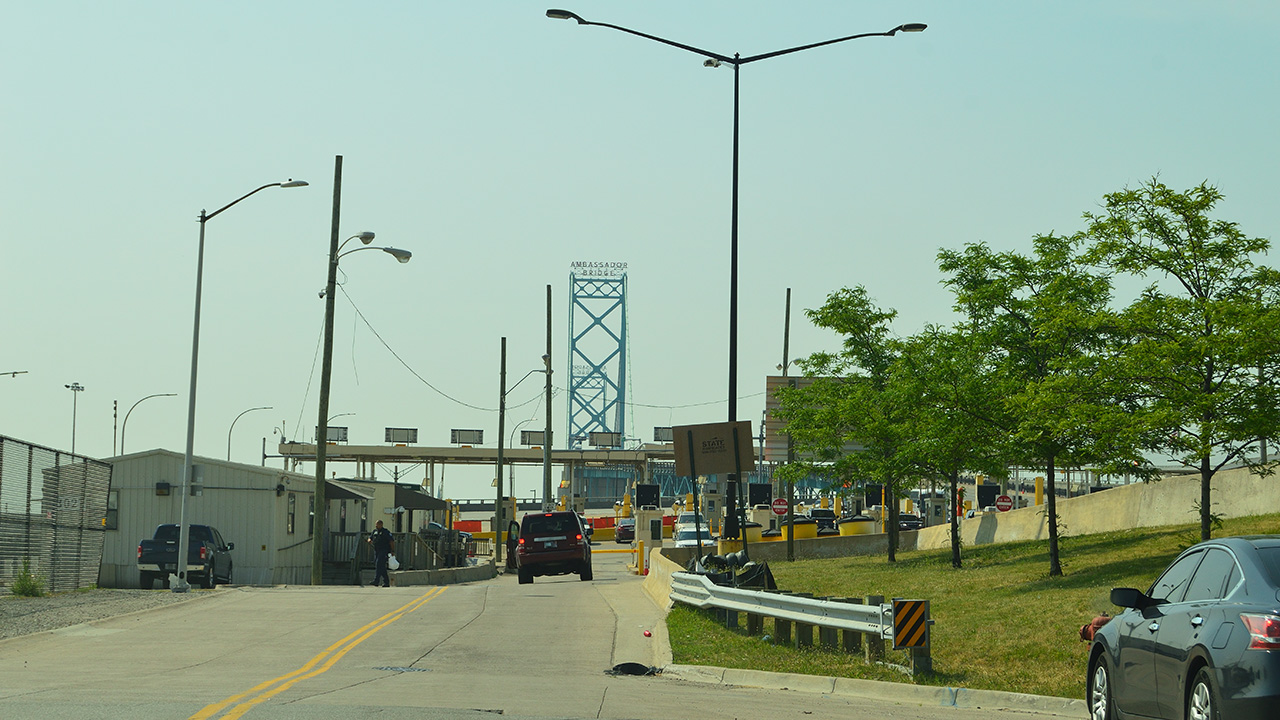More than 40 people arrested in Ambassador Bridge blockade
Protesters against Canada’s mask and vaccine mandates closed the border for nearly a week. Police say they are ready for another blockade should one emerge.

The view from the on-ramp to I-75 in Southwest Detroit.
Windsor police arrested more than 40 people and towed 37 vehicles near the Ambassador Bridge during the nearly weeklong protest there. The bridge reopened late Sunday after opponents to Canada’s public health mandates were removed from Huron Church Road, after blocking U.S.-bound traffic from the border crossing.
Windsor police say they towed dozens of vehicles and issued numerous tickets. Deputy Chief Jason Bellaire said Monday the origins of the protesters were a “mixed bag.” Many of the protesters were local to the Windsor-Essex area, others from neighboring jurisdictions.
“We had people who could walk home for lunch and feed their pets and then come back to the protest,” Bellaire told Windsor City Council. “And we had people that came from hours away and everything in between.”
Windsor police have reopened Huron Church Road, but for bridge traffic only. They say protesters are still staged nearby but they’re not breaking any laws at the moment.
“We understand this has had a significant impact both locally nationally and internationally. Our role was to ensure public officer safety and to maintain order as we prioritized our focus on a peaceful and sustainable resolution.” —Pamela Mizuno, Windsor Police
Windsor Mayor Drew Dilkens made an emergency declaration for the city Monday as police remained situated near the Ambassador Bridge. The move allows Dilkens to bypass certain procedures to manage traffic on Windsor’s streets. Officers are staged along a 5-mile stretch of Huron Church Road and only allowing U.S.-bound vehicles to enter from the 401 highway.
Dilkens told his colleagues on City Council that the order allows the city to manage the fallout from the border crisis.
“It wouldn’t have provided any benefit up front,” Dilkens said. “They actually allow us to get things done now that the event is over to be able to deal with re-routing transit lines and all the operational things from a city perspective that we will now have to deal with.”
Windsor Police Chief Pamela Mizuno said it was necessary to create a buffer zone near the bridge.
“That of course was not an easy decision, as we understand the impact this strategy has on our community. However, we have to balance that with the risks of further protests,” Mizuno said.
In a Sunday press conference, Mizuno said the protest — and subsequent arrests — were peaceful.
“Officers made several arrests and were able to seize vehicles of demonstrators in the area while police officers are authorized by law to use force,” Mizuno said. “At this time I’m not aware of any injuries as a result of any police interaction that has occurred since the onset of the protest.”
A judge ordered the protesters to leave by Friday evening, but many stayed and police slowly towed vehicles and made arrests all weekend.
Mizuno said she was happy with the slow and cautious methods of her officers.
“We understand this has had a significant impact both locally nationally and internationally,” Mizuno said. “Our role was to ensure public officer safety and to maintain order as we prioritized our focus on a peaceful and sustainable resolution.”
Whitmer: “One week was a loss of $51 million”
Gov. Gretchen Whitmer praised the end of the blockade. On Monday, she said she supports state and federal actions to ensure there’s no repeat at North America’s busiest border crossing.
“We cannot let these events like this go unchallenged,” Whitmer said during an online meeting of the Detroit Regional Chamber on Monday. “We have to make sure that people understand if you’re going to do something illegal and create damage in the economy, we won’t let it stand.”
She also said the blockade reinforces the importance of completing a second Detroit-to-Canada border crossing. The Gordie Howe International Bridge is supposed to be completed and operating by the end of 2024.
“This was, I think, a lesson to the world and, frankly, I think some in D.C. didn’t appreciate in the first days how serious the consequences were going to be for our nation but for our state, in particular,” Whitmer said. “One week was a loss of $51 million dollars, and that was just in the auto sector jobs alone.”
Reopening of bridge a relief for auto industry
The resolution comes as a relief to the automotive sector, which moves about $50 million worth of materials across the bridge every day. The crossing is responsible for about 25% of all trade between the U.S. and Canada.
The auto industry relies on “just-in-time inventory,” meaning resources arrive at a location right as they’re set to go into production. But with traffic cut off for days on the Ambassador Bridge, Cox automotive analyst Michelle Krebs says automakers have been scrambling to move parts.
“Ford and GM have either considered or are flying some parts in but that’s not feasible for the long term or not very economical,” Krebs says.
Auto industry advocates vocally opposed the Ambassador Bridge protest throughout last week. Krebs says assembly plants from Canada to Kentucky have had to scale back production as a result.
Trusted, accurate, up-to-date.
WDET strives to make our journalism accessible to everyone. As a public media institution, we maintain our journalistic integrity through independent support from readers like you. If you value WDET as your source of news, music and conversation, please make a gift today.
